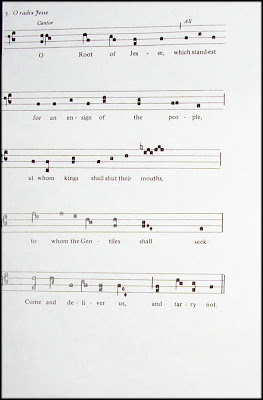December 18:
From the Blackfriars. You can listen to the antiphon sung on each side of Magnificat, as it really is sung, here via this mp3 file at this post at Musica Sacra, where 7 of the antiphons are posted together.
More from "Sapientia-tide: The Great O Antiphons."
Here's the chant score to the antiphon in English:

O Root of Jesse, which standest for an ensign of the people, at whom kings shall stop their mouths, whom the Gentiles shall seek: Come and deliver us, and tarry not.
From the Blackfriars. You can listen to the antiphon sung on each side of Magnificat, as it really is sung, here via this mp3 file at this post at Musica Sacra, where 7 of the antiphons are posted together.
More from "Sapientia-tide: The Great O Antiphons."
Jumping back a thousand years, the deep roots of the antiphons in the English tradition may be seen in the leaves of the Exeter Book, a collection of poetic texts and riddles from the tenth century written in Old English. The opening lines—only partially preserved—are poetic paraphrases of not seven but twelve “O” antiphons that ponder the Advent, the time of waiting, the Incarnation, and its implications for fallen humanity. The choice of these antiphons is not happenstance—rather these texts are rich with spiritual and doctrinal content that beg for further expansion, explanation, and appreciation. I feel this urge today as surely as it was felt over a millennium ago.
Here's the chant score to the antiphon in English:

No comments:
Post a Comment